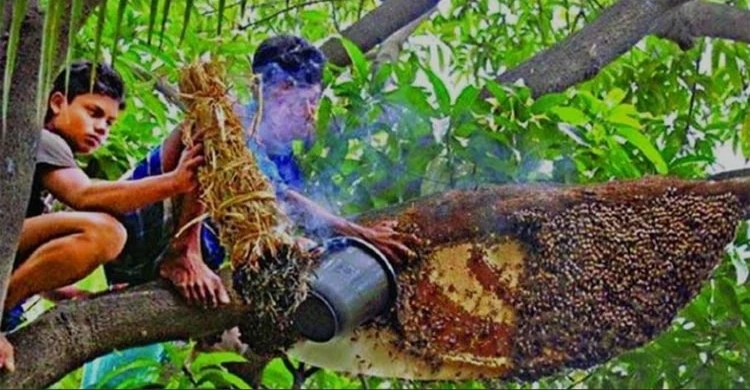Honey collectors return home after harvesting in Sundarbans


Honey collectors have started returning home after completing their harvesting trips in the Sundarbans, where they had entered with 15-day permits issued by the Forest Department.
They said although the honey yield is down this year due to the lack of rain, they were still able to collect good amounts of honey, thanks to the fewer collectors this season.
According to the Forest Department, honey collectors are officially granted permission to collect honey in the Sundarbans starting from Pahela Baishakh each year. However, this year, due to Eid, the issuance of passes began on April 7.
This season, the Forest Department has targeted to collect 150,000 kilograms of honey and 4,000 kilograms of beeswax from the Satkhira Range with an expectation of generating around Taka 32 lakh in revenue during this period.
Honey collectors entered the Sundarbans under the Satkhira Range of the West Forest Division on 15-day permits. They are now returning home before expiry of their permits.
Bakkar Mali, a honey collector from Dumuria area, said, "Since the 15-day pass is about to expire and there are fewer honey-collecting boats this year, everyone has managed to collect some honey. I'm grateful to Almighty Allah that I have accumulated honey and returned safely."
He also highlighted the dangers of honey collection in the Sundarbans, saying honey collectors risk their lives every time they enter the forest.
"Before setting out, we seek doa from our families and neighbors. We leave behind our parents and children, fully aware of the life-threatening risks, just to collect honey," he said.
He added, after collecting around 15 to 20 maunds of honey in the span of 15 days, the honey collectors have now begun returning home.
Billal Sajoni, another honey collector from Gabura's Harishkhali village, echoed similar concerns, stating that "There's no guarantee of safety in collecting honey in the Sundarbans. It's like looking for tigers while searching for honey."
He said, "Tigers live deep in the forest, and honey is often hidden in thick bushes. This year, the lack of rain has reduced the honey yield, but we've still managed to collect some because there were fewer boats."
The honey collectors said apart from the tigers, forest robbers remain a serious threat for them. "If they catch us, they demand up to Taka 50,000 per boat," they added.
They also alleged that some fishermen enter the forest with fishing permits but illegally cut down honeycombs, which has contributed to the reduced honey supply this year.
After their safe return, the honey collectors expressed their gratitude to the Forest Department and local authorities, urging them to increase security in the Sundarbans to ensure safer honey collection in the future.
